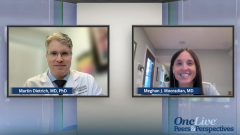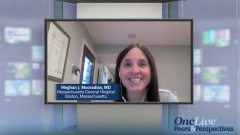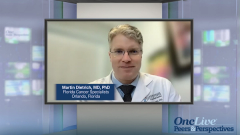
The Role of Molecular Testing In Metastatic NSCLC
Martin Dietrich, MD, PhD, and Meghan J. Mooradian, MD, give an overview of the role of molecular biomarkers in the non–small cell lung cancer treatment space.
Episodes in this series

Transcript:
Martin Dietrich, MD, PhD: Hello, and welcome to this OncLive® Peers & Perspectives® program titled “Role of Immunotherapy in Patients With Non–Small Cell Lung Cancer: Emerging Biomarkers.” I’m Dr Martin Dietrich. I’m a medical oncologist at the Florida Cancer Specialists & Research Institute at the University of Central Florida Cancer Center in Orlando. I am joined today by my fellow expert in the lung cancer field. I would like to welcome Dr Mooradian to please introduce herself.
Meghan J. Mooradian, MD: Hello everyone. I’m Meghan Mooradian, a clinical oncologist at the Massachusetts General Hospital [MGH] in Boston, specializing in thoracic and cutaneous malignancies. I’m excited to spend some time today with you, Martin, and the whole team.
Martin Dietrich, MD, PhD: Welcome. Thank you so much for joining me today. We’re going to discuss updates on the role of immunotherapies in patients with non–small cell lung cancer, and prognostic and predictive biomarkers in the metastatic setting. We’ll discuss the data mainly in the context of its clinical impact on practice. I am looking forward to getting started on this topic. Maybe you can start us out and talk to us a bit about the role of molecular testing in your practice. What do you do when you see a patient with metastatic non–small cell lung cancer? How do you look at the different histologies? A quick overview of your practice would be nice.
Meghan J. Mooradian, MD: Of course. It’s kind of amazing how far we’ve come if you think back over the last 10 to 20 years. We now know that biomarker testing is essential regarding treatment decisions for our patients with non–small cell lung cancer, especially with the list of mutations expanding. At MGH, our practice is to perform next-generation sequencing [NGS] using both DNA- and RNA-based platforms on all of our newly diagnosed stage IV patients, particularly those with adenocarcinoma. We must remember that 5% to 10% of our patients with squamous cell carcinoma will also harbor an actionable alteration. NCCN [National Comprehensive Cancer Network] guidelines recommend testing for the actionable targeted alterations in EGFR, ALK, ROS1, RET, KRAS, G12C, BRAF, MET, HER2, and NTRK, which NGS covers. I think we’ve all become accustomed to using these broad-based panels. It’s more efficient, and it helps avoid the tumor exhaustion we can run into if we’re testing one biomarker at a time.
Obviously, this biomarker testing is important. These are predictive biomarkers that help us identify patients who are really going to benefit from a targeted approach. When we see patients in the clinic, particularly those with a stage IV diagnoses, that first algorithm to me is doing this next-generation sequencing. For those patients who are wild type, and obviously for all comers, we care about the PD-L1 TPS [tumor proportion score] as well. Really understanding and encompassing that PD-L1 TPS expression, which is performed by immunohistochemistry in the context of the molecular testing, is important. We’re lucky that PD-L1 TPS is reflexively done on all of our non–small cell lung cancer specimens regardless of stage. That’s obviously become more helpful as we’ve seen immunotherapy and targeted therapy now touch not only the adjuvant setting, but most recently the neoadjuvant setting. There are a lot of advancements and information that oncologists need to have when they’re first seeing a patient in the clinic. I’ll turn it over to you, Martin. What’s your standard practice at your institution?
Martin Dietrich, MD, PhD: We have a very similar kind of concept. We’ve established an in-house DNA, RNA platform on an Illumina [technology] backbone, where all patients with locally advanced metastatic lung cancer are being tested. We are trying to expand this into virtually all lung cancers, both in early stages as well as the other histologies that are squamous and large cell-based. Even in the early stages, we now really need biomarkers to guide us for proper treatment selection. I don’t think there’s ever going to be a lung cancer in the future that’s not going to be benefiting from molecular testing, if not already in the early-line setting, certainly at relapse.
Transcript edited for clarity.






































